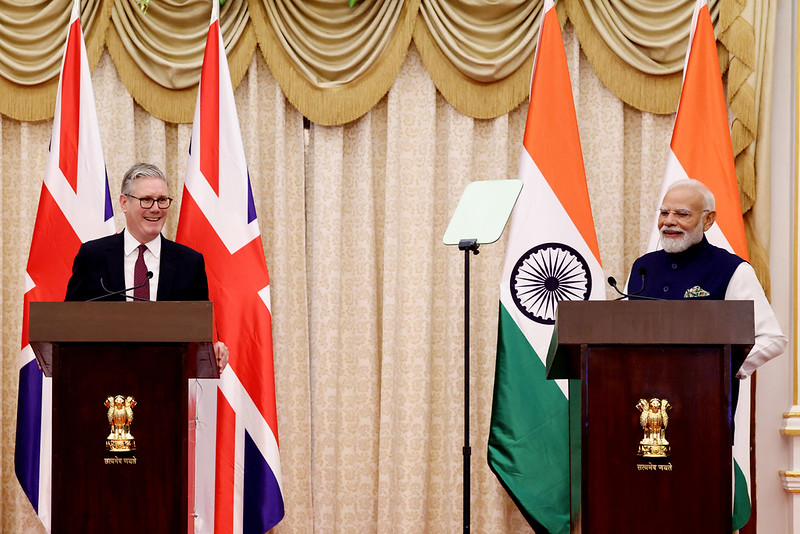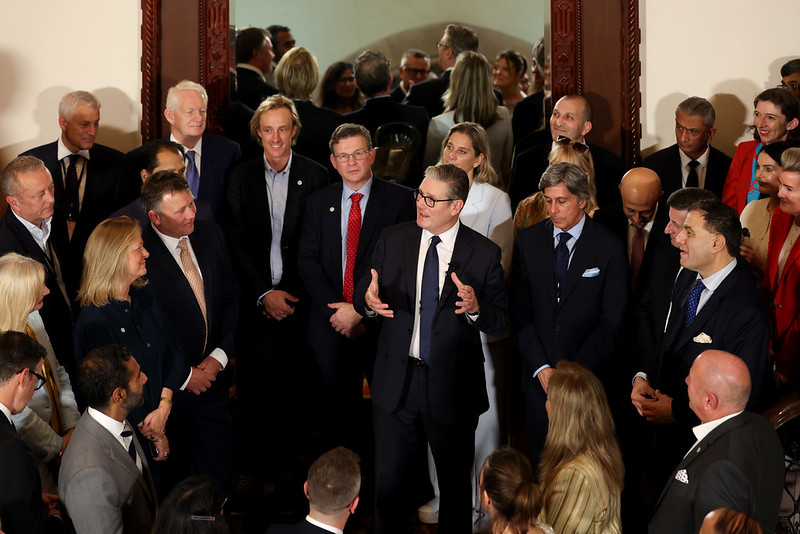
By A Special Correspondent
Prime Minister Sir Keir Starmer made his first trip to India with the largest business delegation in the history of the two countries’ bilateral relations. Accompanied by 126 CEOs, tech entrepreneurs, cultural leaders, and vice-chancellors of the UK’s top universities, Starmer aimed to highlight the standout achievement of his first year in office: clinching the Free Trade Agreement (FTA) with India.
Starmer’s visit to Mumbai, India’s business capital, on October 8–9 sought to strengthen economic ties ahead of the FTA’s implementation. Signed in July at Chequers but still awaiting parliamentary approval, the agreement was presented as a major domestic victory for Starmer. At a time of declining popularity at home, it allowed him to showcase the largest trade deal post-Brexit, an achievement that had eluded his Conservative predecessors.

Photo: Prime Minister Keir Starmer meets UK and Indian businesses: 08/10/2025. Mumbai, India. Prime Minister Keir Starmer meets leading UK and Indian businesses figures at the Taj Mahal hotel. (Credit: Simon Dawson/No 10 Downing St)
The FTA is designed to reduce tariffs on goods ranging from cars to whisky, textiles to jewellery, while increasing market access for businesses. India and the UK are already established trade partners, with the agreement aiming to boost bilateral trade by £25.5 billion by 2040.
India, recovering from high tariffs imposed during the Trump administration, rolled out the red carpet for Starmer. His face appeared on billboards across Mumbai, and Prime Minister Narendra Modi reportedly instructed that his UK counterpart be made “very welcome” in India.
The visit secured £1.3 billion in investment from 64 Indian companies, creating 10,600 UK jobs across engineering, defence, and technology sectors. In return, £3.6 billion in British investment was announced for India.
Before the trip, Starmer clarified that the visit focused on trade and culture, not immigration, explicitly ruling out any relaxation of visa rules for Indian workers or students. This aligns with the Labour government’s recent goal to reduce overall UK immigration levels.
British education remains highly coveted in India, with Indian students outnumbering all other international students at UK universities in recent years. However, post-study work visas and overstays have been contentious over the last decade.

To address this, Starmer encouraged UK universities to open campuses in India. Lancaster and Surrey universities will launch campuses, building on Southampton’s Delhi opening in July, with six further universities—including Bristol, York, Liverpool, and Aberdeen—planned by next year.
India currently has 40 million university students, with demand expected to rise to 70 million places by 2035. UK universities hope to capitalise by offering degrees locally in India, reducing the need for visas while expanding educational influence.
However, this initiative has drawn criticism in both countries. Indian universities fear losing top lecturers and students to UK institutions offering higher salaries and prestige. UK universities face financial risk, as students may opt for the cheaper option of studying a UK degree locally.
Defence was another focus. A £350 million deal was signed for the UK to supply Lightweight Multirole Missile systems to the Indian military, securing over 700 jobs in Northern Ireland. The deal also sets the stage for a broader complex weapons partnership between the UK and India, currently under negotiation.
The countries also agreed to establish an India–UK connectivity and innovation centre, a joint AI development centre, and a critical minerals industry guild to coordinate safe mining and processing.
Ahead of the trip, Starmer indicated he would raise the case of Jagtar Singh Johal, a British Sikh imprisoned in India for eight years without conviction. Johal, from Dumbarton near Glasgow, was arrested in November 2017 shortly after his wedding. Despite being acquitted earlier this year in a separate case, he remains in prison. Starmer, when asked post-visit, stated, “We always raise consular cases on every level,” without naming Johal specifically. Johal’s family expressed disappointment at the lack of progress. Gurpreet Singh Johal, his elder brother, told the press, “Jagtar’s wife will spend her eighth wedding anniversary without her husband.”
Notably absent from discussions was the 2002 murder of three British Muslims in Gujarat. Shakeel and Saeed Dawood and their friend Mohammed Aswat were among more than 2,000 victims of an anti-Muslim pogrom while Narendra Modi was Chief Minister. The sole survivor, Imran Dawood, has long sought justice, but efforts suffered a setback in 2015 when a Gujarat court acquitted six accused men. Starmer appears to have avoided raising the issue with Modi.
Feature photo: UK PM Keir Starmer and India’s Narendra Modi meet in Mumbai for pivotal bilateral talks, aiming to strengthen economic partnership between their nations. (Credit: Simon Dawson/No 10 Downing St)